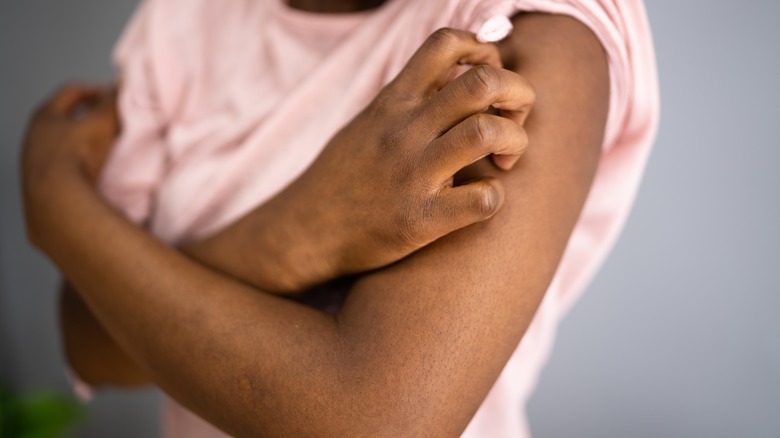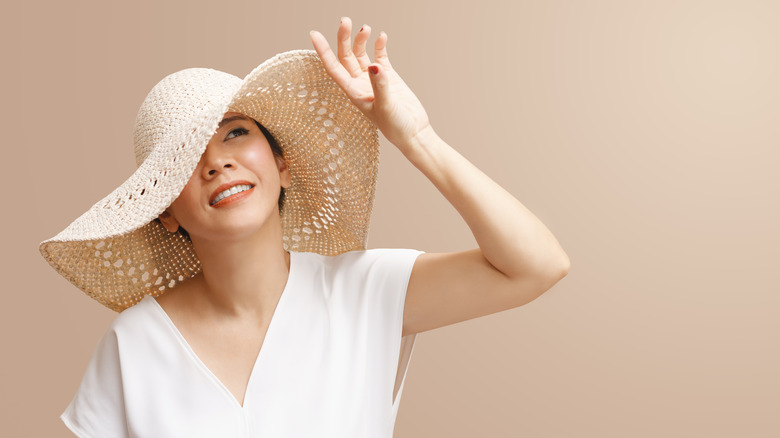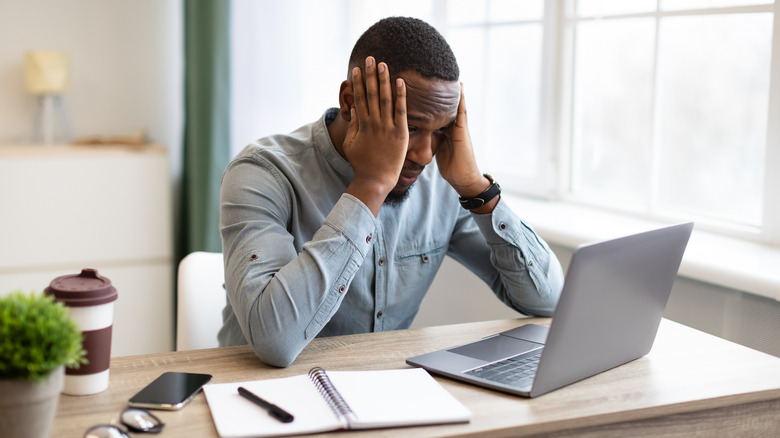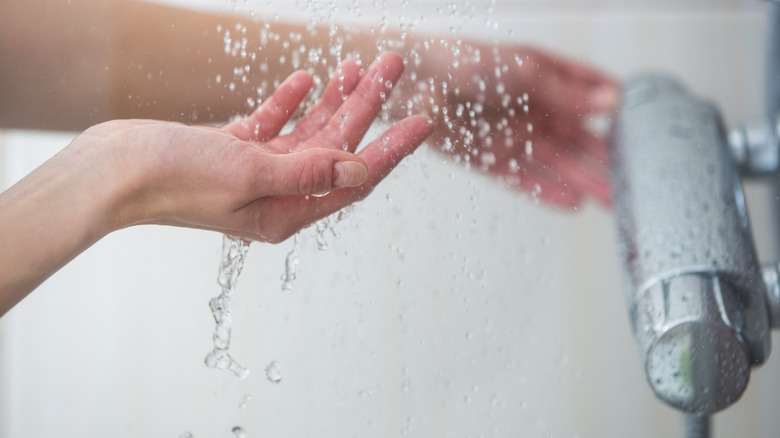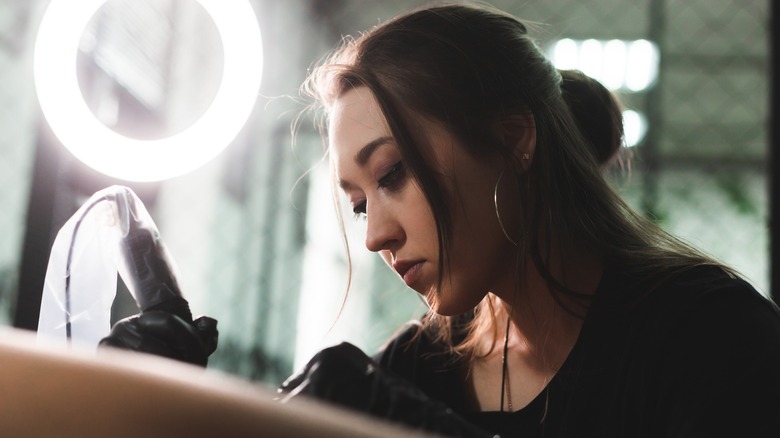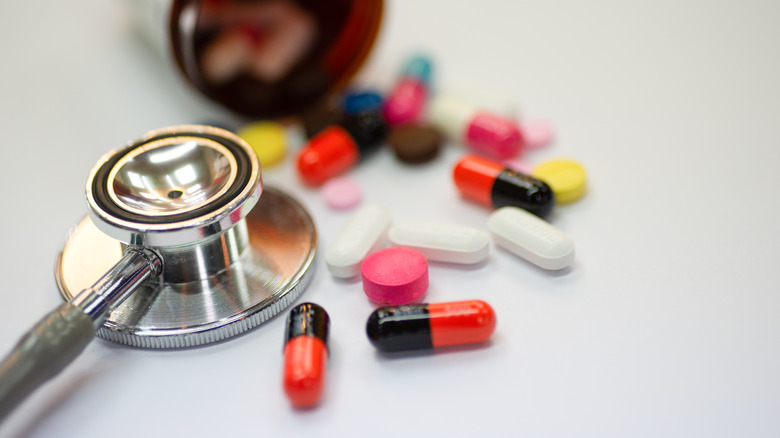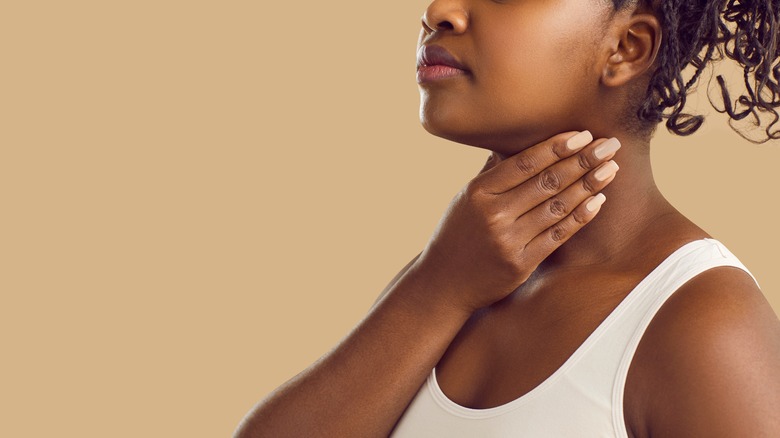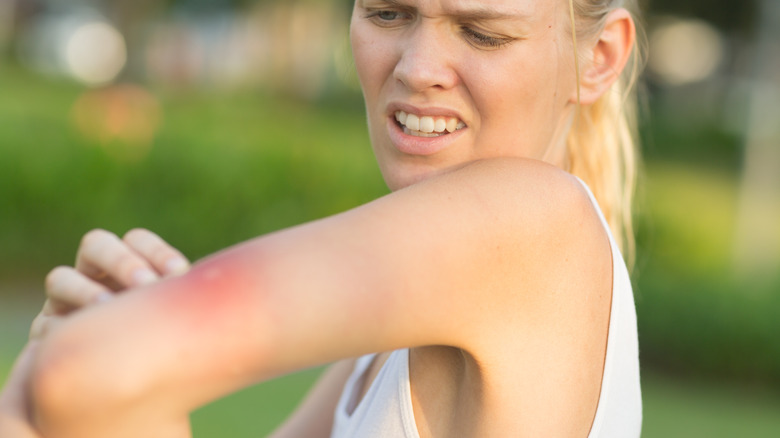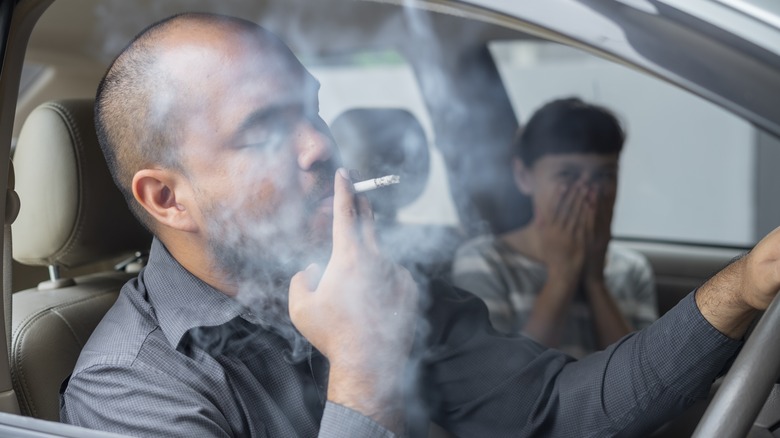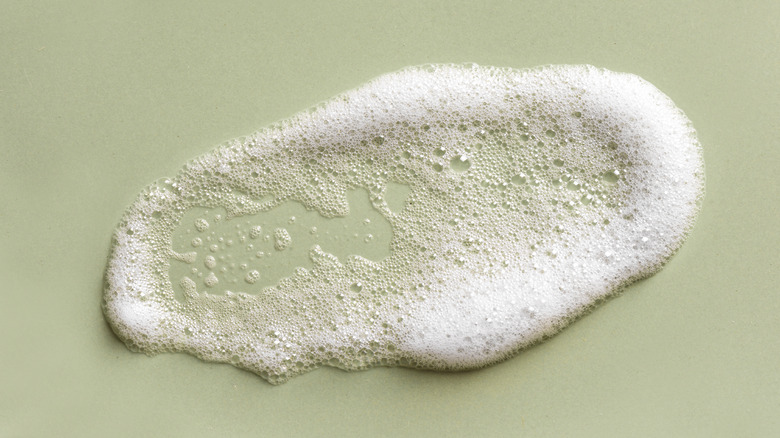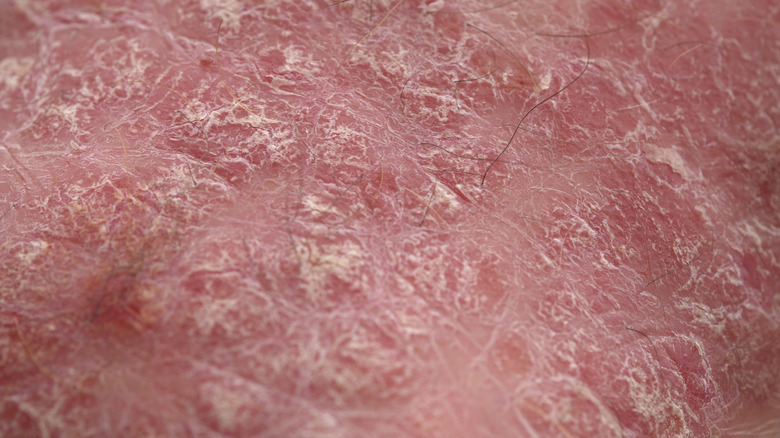14 Things You Didn't Realize Could Trigger Psoriasis Flare-Ups
If you don't have psoriasis, you might not give it much of a second thought — but trust us when we say that it's likely you know someone who does have it. Varying in severity from case to case, psoriasis affects over eight million people across the United States, and approximately 125 million people around the globe (per the National Psoriasis Foundation). Characterized by the appearance of patches on the skin that may appear dry or scaly, psoriasis is caused by an overproduction of skin cells, says the National Health Service (NHS).
With no cure for psoriasis, trying to conduct a lifestyle that manages flare-ups as much as possible is key — but the problem is, the skin condition can sometimes seem to have a mind of its own, with psoriasis being triggered by a huge number of factors. And for folks who have psoriasis, trying to keep track of their individual triggers can sometimes seem like an insurmountable challenge. That's why we decided to put together a list of all of the things that might trigger a psoriasis flare-up so that you can finally determine what might be prompting your condition further.
Too much sunlight can cause your psoriasis to rear its head
We're commonly taught that a little bit of sunlight is good for our skin. And for some people who have psoriasis, getting a moderate amount of sunlight on their skin could be beneficial for their condition, according to Medical News Today. The combination of UV rays and vitamin D that sunlight provides may ease psoriasis symptoms, with the natural UV light that the sun provides potentially lessening inflammation and scaling.
The problem, however, is when you get too much sunlight. Not only does the sun cause your skin to age more quickly, but staying out in the sun for too long will result in your skin burning, which may result in a psoriasis flare-up, says WebMD. Sunburn can also skyrocket your risk of developing skin cancer. Flare-ups caused by sunlight make monitoring your sun exposure especially important if you have psoriasis, with dermatologists recommending that you try and keep out of the sun as much as possible between 10 a.m. and 2 p.m. when the sun's rays are at their most intense. It's also vital to wear sunscreen that you reapply regularly and wear clothes that protect your skin from the sun.
When you're feeling stressed, psoriasis can flare up
Let's face it: No one likes to be stressed. And alongside the other physical symptoms that stress can cause, like headaches, reduced or increased appetite, higher susceptibility to illness, and gastrointestinal changes (per WebMD), being stressed may also affect your psoriasis. It's important to note that, as NYU Langone Health's assistant professor of dermatology Evan Rieder told Healthline, "in and of itself, stress is not going to be something that causes psoriasis to develop out of the blue." But if you already experience the condition, the havoc that stress can play on your hormonal system, and particularly your supplies of cortisol (also known as the "stress hormone"), may cause skin inflammation to increase, resulting in scaling.
The problem is, too, that having a flare-up of psoriasis may also cause further stress, leading to a cyclical problem. That's why it's really important to try and manage your stress as much as possible, first by trying to determine the cause of your stressful emotions, and then applying a stress-relief method that works for you, whether that be deep breathing, meditation, or speaking with a friend, healthcare professional, or therapist. "Focus on whatever is getting in the way of you being able to live your best life," says Rieder (via Healthline).
The way that you wash your body might be triggering psoriasis
A shower or bath at the end of a long day is truly the stuff of dreams, folks. But if you're noticing that your psoriasis has been a little more persistent of late, it might be time to reconsider exactly how you're bathing. Washing your skin can result in it becoming drier and more inflamed, according to the American Academy of Dermatology Association (AAD), especially if you're using hot water or taking especially long showers or baths.
That's why the AAD recommends that you bathe only using warm water, and keep your showers or baths to just one per day, ideally for a short amount of time. Remember, too, not to use any abrasive materials on your skin, like loofahs or scrubbers, and to only wash your skin using your hands, rinsing everything off gently once you're done. When you're drying off your skin, don't rub it vigorously with your towel, but instead blot it gently, allowing it to air-dry to finish off. And try to avoid using harsh soaps or washing products, too — try to seek out brands that will be kind to your skin.
Drinking alcohol can be bad for psoriasis
Drinking alcohol regularly may not be the best thing you can do for your health: Although there has been a long-standing discussion around alcohol's potential benefits to the heart, drinking alcohol to excess has also been linked to lower immune system function, increased likelihood of developing various types of cancer, higher blood pressure, and heart disease (per the Centers for Disease Control and Prevention).
And for people with psoriasis, drinking alcohol may also not be the best thing for their skin. Increased alcohol intake may result in a higher incidence of psoriasis, according to a study published in JAMA Dermatology, which found that people who drank nonlight beer specifically seemed to show more likelihood of displaying the condition. One reason why alcohol may be particularly bad for psoriasis is down to its inflammatory qualities, as a further study published in the International Journal of Dermatology indicates. The ethanol in alcohol may potentially trigger inflammatory reactions in the skin, with alcohol misuse also leading to a higher risk of liver disease, which can have negative implications on psoriasis symptoms.
When the winter season arrives, your psoriasis may become worse
Ah, the wintertime. 'Tis the season to wrap up warm, to drink endless cups of hot chocolate, and to ... Start to manage those psoriasis symptoms a little more than usual. Unfortunately, when the cold weather starts to creep in, you may notice your psoriasis start to flare up, says Vanguard Dermatology. This is because when the air is cooler, it's also drier, and this will end up having a drying effect on your skin. Not only will this cause psoriasis symptoms to increase, but you may also have to contend with split, bleeding scales as they lose moisture.
As such, taking precautions during the winter months to protect your skin is crucial. The best thing you can do is try to raise the moisture levels of your skin, through a variety of methods. Applying regular moisturizer when it's especially cold outside — ideally using a thick moisturizer — will assist in preventing flare-ups and managing them when they happen, says WebMD. Applying moisturizer or lotion is especially important after you've washed so that your skin doesn't dry out post-shower. It's also useful to use a humidifier in your bedroom while you sleep, or in any other room you where spend a significant amount of time, and to opt for skin-friendly clothes that won't irritate or scratch the scaling on your skin.
Getting a tattoo could cause a psoriasis flare-up
For many people, having a tattoo is the ultimate sign of cool. But if you have psoriasis, getting inked up may also prove troublesome for your skin, and potentially generate a renewed bout. Getting a tattoo, which requires intentionally damaging the skin to insert the ink needed for your tattoo choice into it, can provoke something called the Koebner phenomenon, says Medical News Today. The Koebner phenomenon is when your skin reacts to trauma by causing a flare-up of a pre-existing skin condition, like psoriasis (per the Cleveland Clinic).
Naturally, this can make the idea of getting a tattoo if you do have psoriasis pretty unappealing. But if you have your heart set on getting your tattoo fix, there are a few factors to consider before doing so. It's advisable to choose a part of the body where your psoriasis generally doesn't flare up as much, and to go for your session when you're not in the middle of a flare. It's also vital to follow the proper aftercare routine that your tattoo artist recommends. If you have any doubts or concerns about getting a tattoo if you have psoriasis, it's worth talking with your doctor, as well as the tattoo artist you'd potentially be working with.
Psoriasis can be made worse by consuming a high-calorie diet
Following a lifestyle that has a well-rounded, well-balanced diet at the center of it is vital for your health. But if your diet is especially high in calories, it could have implications for a lot of other health considerations, including psoriasis. A high-calorie diet can lead to weight gain, which may also increase psoriasis symptoms, according to a study published in JAMA Dermatology. The study followed a group of participants with psoriasis who were placed on a low-calorie diet, and as they lost weight, their psoriasis also seemed to become less severe.
The researchers who conducted the study were not conclusive about why weight loss seemed to result in fewer psoriasis symptoms, but one explanation they proposed was that it may be due to the lower levels of inflammation that occur when weight is lower. If you're considering embarking on a weight loss program, though, it's important to remember that making simple changes to your lifestyle, like incorporating exercise into your daily routine or eating more plant-based foods, can make a massive difference (per WebMD).
If you're taking certain medications, your chance of a psoriasis flare-up could be higher
If you have psoriasis, it may be the case that your doctor has prescribed you medication to help manage your condition. But it's useful to bear in mind that if you're taking other medications for different health conditions, that may be having a less-than-ideal impact on your skin. Certain medicines, like beta-blockers or ACE inhibitors, may be given to you to manage blood pressure, but can also have an impact on your autoimmune process, thereby causing a flare-up of psoriasis (per Healthline). Medication prescribed to treat shorter-length conditions, like malaria pills or hepatitis C medicine, might also provoke a psoriasis attack.
It's also worth keeping in mind that while certain medicines may help your psoriasis, you need to be super careful about how and when you stop taking them. If you're using a steroidal medication, for example, halting its use suddenly can instigate a big psoriasis flare-up. Always consult with your doctor as to how you should taper off your medication, and follow the instructions that they give you to the letter.
Infections may trigger psoriasis flares
It feels like a bit of a cruel joke that if you get ill with one thing, it can also flare up something entirely different, causing a double-whammy of annoyance and misery. But such is life, and such is the case with psoriasis. Becoming ill with an infection can provoke a psoriasis flare-up, as the Mayo Clinic points out, with some skin infections leading to more scaling as a byproduct. Contracting strep throat may also result in you seeing your psoriasis increase.
While it's still not entirely clear why strep throat can cause psoriasis to flare up, one reason could be because when you have the infection, your body responds by making T cells, which then inflame the skin and result in the condition raising its head (per a study published in Clinical & Experimental Immunology). It's useful to remember that not everyone will experience a psoriasis flare-up when they become ill with something else, but if you do become under the weather, it might be worth taking precautions to minimize any potential psoriasis impact.
Any abrasions or injuries to your skin might result in psoriasis being triggered
There is a huge range of triggers for psoriasis, and often it's provoked by seemingly invisible things. But in other cases, psoriasis flare-ups may occur because of more obvious causes. When your skin is damaged through any abrasions or injuries via external factors, this can be a starting point from which psoriasis starts to recur, says the AAD. The flare-up will usually rear its head close to the injury, often around the same area, within a few weeks.
Bear in mind that you don't have to endure a huge amount of damage to your skin for psoriasis to be provoked: Something as small as a bug bite, scratch, or bruise can trigger the condition. While this might sound like a nightmare, there are several precautions you can take to reduce the likelihood of your psoriasis blossoming. Any trauma to the skin should be dealt with immediately, caring for your cut or bite as you normally would, to limit the likelihood of a flare-up. If you have a bug bite specifically, it's wise to try and limit scratching it as much as possible, as this may provoke your skin further.
If you smoke, you may be making your psoriasis worse
You don't have to be a health genius to be aware of the myriad negative effects that smoking has on your body, with everything from cancer, to hearing and vision loss, to osteoporosis made more likely by inhaling tobacco (per the Australian Government Department of Health and Aged Care). And if you have psoriasis, or have a family history of the condition, you have even more reason to put down the cigarettes. "Smoking tobacco can not only increase your risk of developing psoriasis, but it also can increase the severity of your disease," warns the American Lung Association's chief medical officer Albert A. Rizzo via the National Psoriasis Foundation. Smoking floods your body with free radicals and cytokines, both of which provoke inflammation more rapidly, resulting in an increased likelihood of scaling and flare-ups. If you're more susceptible to the condition, smoking can also trigger DNA receptors that may cause psoriasis that once lay dormant to become active.
Further, your smoking may inhibit the effectiveness of any medication or topical treatments you use for your psoriasis, says Washington Dermatology Center medical director Ronald Prussick (per the National Psoriasis Foundation). Remember, too, that you don't have to be the one smoking for your psoriasis to be triggered — proximity to cigarette smoke can also cause the condition to rear its head.
Using certain skincare products may cause your psoriasis to spike
People who have psoriasis will know the importance of treating their skin well. But unfortunately, sometimes in the pursuit of making their skin feel better, they may end up making their psoriasis worse. Certain skincare products are wise to keep off the table when you have psoriasis, thanks to their potential to cause symptoms to flare up (per Healthline). For example, products made with sulfates — a common ingredient in soaps and haircare products that aids the foaming process — may aggravate your skin, prompting a bout of the condition.
Elsewhere, how your product smells may be the problem. Even mildly fragranced skincare products can contain ingredients that trigger psoriasis, which is why it's super important to try to lean toward fragrance-free products. Above all, though, you must avoid any skincare products, lotions, or perfumes, that have alcohol in them. Alcohol (which could be more common than you think in products geared toward the skin) will cause your skin's upper layers to dry out, which then makes your psoriasis more likely to appear. Try to choose products that aren't "quick-drying," and instead use thicker, more unctuous lotions and creams that will keep the moisture locked into your skin.
Your hormone balance could be the cause of your psoriasis
The fluctuations of the body throughout life are responsible for innumerable changes, and hormones generally have a part to play in a lot of them. But sometimes, these hormonal rises and falls have consequences that we might not expect, including triggering psoriasis symptoms in people with the condition (per WebMD). Puberty is a key time for people who have psoriasis, and when hormones like progesterone or estrogen start to rise more significantly, it may result in changes to the skin, including a psoriasis flare-up.
This can also occur in pregnant people as the body goes through an enormous number of adaptations to support the baby's growth and delivery. Interestingly, during pregnancy psoriasis symptoms may lessen, thanks to the pregnancy hormones that flood the system keeping it at bay. But once the baby is delivered, things can start to change pretty quickly, and the resultant changes to the hormonal and immune systems could see your psoriasis triggered once more. The hormonal fluctuations that happen during menopause could also provoke a psoriasis flare-up, and may also prompt psoriatic arthritis, says WebMD.
If you have psoriasis, be careful with what you're eating
We're taught pretty much from day one that a healthy diet is the cornerstone of healthy living. And if you have psoriasis, it's doubly important that you keep an eye on what you eat — especially as, in addition to some usual suspects, there are some foods that you might assume would be good for you, but aren't.
Foods that are made with refined white flour, red meat products, and processed food made with copious amounts of sugar and fat are all advised to be avoided if you have psoriasis, thanks to their potential to trigger symptoms, according to Healthline. It may also be wise to skip foods that contain gluten, like bread or cakes, and foods that are made with dairy, thanks to their potential to impact the skin. Other foods, however, you may not expect to have to consider leaving out of your diet. Shellfish may be a particular trigger for psoriasis symptoms, as might pork products. And it's especially useful to be on your guard about eggplant, tomatoes, white potatoes, and any other foods that are part of the nightshade family. These could be particular triggers for psoriasis, and in fact, it was shown in a survey published by Dermatology and Therapy that over half of respondents experienced skin improvements to their psoriasis by limiting these foods in their diets.
How to handle a psoriasis flare-up
When you have a psoriasis flare-up, it can be super annoying to manage. And though the best way to handle psoriasis incidences is to try and avoid them altogether by paying close attention to your lifestyle and your triggers, sometimes they can't be helped.
The most important thing you can do when you have a bout of psoriasis is to try and keep your skin as moist as possible. Trying to lock moisture into your skin can help it to heal and minimize redness and irritation, according to Healthline. Using heavy-duty, thick moisturizers and creams is most effective here, as they keep the moisture in your skin — and if you place them in the fridge before you use them, they may have a further calming effect, with the colder temperature potentially providing pain relief. While it's easier said than done, it's also super important to attempt to limit the amount of scratching you do when you have a psoriasis flare-up. This is particularly important when it comes to your scalp, as too much itching or irritation may end up causing hair loss.

